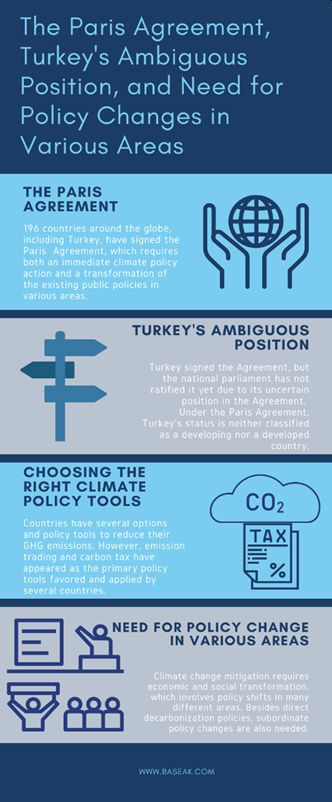- within Tax, International Law and Energy and Natural Resources topic(s)
- with readers working within the Aerospace & Defence, Banking & Credit and Media & Information industries

Climate change related to global warming is a reality documented by scientific evidence and accepted by the international community. The Paris Agreement has been the recent international cooperation against climate change. 196 countries around the globe, including Turkey, have signed the Agreement, which requires both an immediate climate policy action and a transformation of the existing public policies in various areas.
In this short article, first, we will highlight the Paris Agreement and Turkey's situation. We then will elaborate on the possible climate policy actions and the need for the transformation in many public policies.
The Paris Agreement and its framework
Global warming is the result of greenhouse gases (GHG) released into the atmosphere, mainly due to fossil-fuel-based energy generation, industrial processes, and agricultural activities. International efforts to mitigate global warming started in 1992 via adopting the United Nations Framework Convention on Climate Change (UNFCCC). Since 1995 the parties to the UNFCCC have met regularly at the Conference of Parties (COPs) to commit reduction of their GHG emissions.
The latest conference (21st Conference of the Parties - COP21) was held in Paris in December 2015. In COP21, countries were asked to voluntarily define their GHG emission reduction so-called Intended Nationally Determined Contributions (INDCs). In this way, the latest legally binding international treaty on climate change has appeared, so-called the Paris Agreement1.
Implementation of the Paris Agreement requires economic and social transformation, based on a 5-year cycle of climate policy actions carried out by countries through their INDCs. The Paris Agreement provides a framework that developed countries should take the lead in emission cutting and provide financial assistance to developing countries. Besides the financial supports, the Agreement requires climate-related capacity-building and technological aid for developing countries supported by the developed countries. Thus, the Agreement renders the developed countries liable for their emission cut targets and supporting the countries who need financial, technical, and capacity-building assistance.
Turkey's ambiguous position
Turkey is one of the participants of the COP21 and signatory of the Paris Agreement. Although Turkey signed the Agreement, the national parliament has not ratified it yet due to its uncertain position in the Agreement.
Until the Paris Agreement, Turkey was listed as an Annex I country with special conditions2. More clearly, Turkey was accepted as an industrialized country but was not subject to severe emissions restrictions and not liable to support the other countries. However, in the Paris Agreement, countries are categorized according to their development levels, and this categorization determines their obligations. While developed countries are expected to conduct severe emission reductions and provide financial assistance to developing countries, developing countries are only expected to contribute to these mitigation efforts voluntarily.
However, under the Paris Agreement, Turkey's status is neither classified as a developing nor a developed country. Therefore, Turkey's categorization under the Agreement is ambiguous. It is not clear whether Turkey can benefit from international financial support to achieve its emission targets.
Although Turkey has not ratified the Paris Agreement because of its ambiguity, it had submitted its INDCs before COP21. In its INDC document, Turkey commits to reduce its GHG emissions by 21 percent, comparing its Business-As-Usual (BAU) path by 2030. Without its ratification, the Agreement might not be binding, but the United States' return to the Paris Agreement leaves Turkey in a group of few countries that have not ratified the Agreement. Those countries are Iran, Iraq, Libya, Sudan, and Yemen3. Recent political messages can be seen as initial indicators of the Paris Agreement's ratification very soon4. However, achieving the target of cutting GHG emissions by 21 percent will create significant economic impacts. Therefore, choosing a proper policy to meet the targets is critical.
Choosing the right climate policy tools
Countries have several options and policy tools to reduce their GHG emissions. However, emission trading and carbon tax have appeared as the primary policy tools favored and applied by several countries5. Emission trading is based on setting a cap on the amount of carbon emitted by the system. Within that cap, the agents in the system either receive for free or buy emission permits. On the other hand, the carbon tax is based on levying a tax for economic activities' carbon content. It can take a form of a tax imposed on fossil fuels in proportionate to carbon emissions or set on a good or service proportional to carbon emission released during its production.
From an economic perspective, both policy tools - carbon tax and emission trading system - are equivalent in reducing emissions. But they differ due to setting emission prices. While the policymakers directly appoint carbon taxes, they only impose the caps and let the markets set the price under the emission trading system6. However, from a political perspective, an emission trading system is more favored than a carbon tax to avoid possible electoral support loss.
Although the emission trading system seems politically preferable, it requires a detailed inventory of GHG emissions per sector and adequate institutional capacity to apply it. Yet, applying the carbon tax is institutionally much more comfortable; its implementation is relatively simple. Besides, carbon tax revenues may be used to subsidize renewable energy resources and to support vulnerable areas due to decarbonization policies.
Turkey's GHG emission inventory is not in sufficient detail to define sectoral caps. Also, the financing mechanism is not at an adequate level, and tracking capacity is quite limited7. Therefore, it is hard to implement an emission trading system in Turkey in the near future. There are currently very few studies trying to assess Turkey's climate change mitigation policies and their impacts on the Turkish economy8. All of them favor a carbon tax policy accompanied by various subsidies.
Need for policy change in various areas
As we mentioned at the beginning, climate change mitigation requires economic and social transformation, which involves policy shifts in many different areas. Besides direct decarbonization policies, subordinate policy changes are also needed.
At the first look, energy and environmental policies are at the front. However, fighting against climate change needs policy changes in transportation, agriculture, urbanization, and waste. In addition to these, economy-wide public policies should also be adjusted to support the mitigation efforts. Competition policy is one of them. Our next article will examine how specifically competition policy may contribute to the fight against climate change.
Footnotes
1. UNFCCC: The Paris Agreement, available at https://unfccc.int/process-and-meetings/the-paris-agreement/the-paris-agreement, accessed on 22.01.2021.
2. Report of the Conference of the Parties held in Cancun, December 2010. Available at https://unfccc.int/resource/docs/2010/cop16/eng/07a01.pdf, accessed on 22.01.2021.
3. UNFCCC, Paris Agreement - Status of Ratification. Available at https://unfccc.int/process/the-paris-agreement/status-of-ratification, accessed on 22.01.2021.
4. Anadolu Agency, Turkish president marks 75th anniversary of UN. Available at https://www.aa.com.tr/en/turkey/turkish-president-marks-75th-anniversary-of-un/2017922, accessed on 22.01.2021.
5. The World Bank, Carbon Pricing Dashboard. Available at https://www.aa.com.tr/en/turkey/turkish-president-marks-75th-anniversary-of-un/2017922, accessed on 22.01.2021.
6. TIMILSINA, G. R. (2018). Where Is the Carbon Tax after Thirty Years of Research? In World Bank Policy Research Working Paper (Policy Research Working Papers, Issue 8493). The World Bank. Available at https://doi.org/10.1596/1813-9450-8493, accessed on 22.01.2021.
7. TÜSIAD. (2016). Ekonomi Politikalari Perspektifinden Iklim Degisikligiyle Mücadele.
8. TÜSIAD. (2020). Ekonomik
Göstergeler Merceginden Yeni Iklim Rejimi.
TÜSIAD. (2016). Ekonomi Politikalari Perspektifinden Iklim
Degisikligiyle Mücadele.
ACAR, S., VOYVODA, E., & YELDAN, E. (2018). Macroeconomics
of Climate Change in a Dualistic Economy: A Regional General
Equilibrium Anlaysis. Elsevier Inc.
YELDAN, E., VOYVODA, E., BERKE, Ö., & SAHIN, Ü.
(2015). Türkiye Için Düsük Karbonlu
Kalkinma Yollari Ve Öncelikleri. WWF-Türkiye,
Sabanci Üniversitesi Istanbul Politikalar Merkezi.
The content of this article is intended to provide a general guide to the subject matter. Specialist advice should be sought about your specific circumstances.


